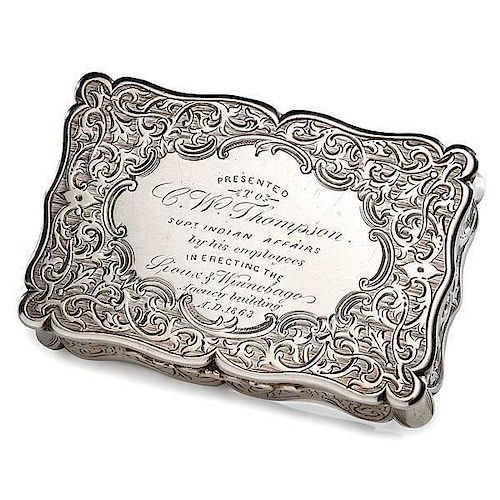Silver Snuff Box Presented to C.W. Thompson, Superintendent of Indian Affairs, in Honor of Erecting the Sioux & Winnebago Agency Building, 1863
About Seller
6270 Este Ave.
Cincinnati , OH 45232
United States
With offices in Cincinnati, Cleveland and Denver, Cowan’s holds over 40 auctions each year, with annual sales exceeding $16M. We reach buyers around the globe, and take pride in our reputation for integrity, customer service and great results. A full-service house, Cowan’s Auctions specializes in Am...Read more
Two ways to bid:
- Leave a max absentee bid and the platform will bid on your behalf up to your maximum bid during the live auction.
- Bid live during the auction and your bids will be submitted real-time to the auctioneer.
Bid Increments
| Price | Bid Increment |
|---|---|
| $0 | $25 |
| $500 | $50 |
| $1,000 | $100 |
| $2,000 | $250 |
| $5,000 | $500 |
| $10,000 | $1,000 |
| $20,000 | $2,500 |
| $50,000 | $5,000 |
| $100,000 | $10,000 |
About Auction
Jun 13, 2014 - Jun 14, 2014
Cowan's Auctions dawnie@cowans.com
- Lot Description
Silver snuff box, engraved on the lid Presented to C.W. Thompson / Sup't Indian Affairs / by his employees / In Erecting The Sioux & Winnebago Agency building / A.D. 1868; 2.25 x 3.375 x 13/16 in. high, with hallmarks [anchor], ES, and M.
Clark W. Thompson (1825-1885) was a Canadian who was never naturalized as a US citizen, but nonetheless served in a variety of state and national governmental positions. A miller, he began his government service upon election to the Minnesota Territorial House in 1854, representing three southeastern counties, and in the following term was elected to the Territorial Council. Thompson participated as a Republican in the Minnesota Territorial Constitutional Convention in 1857, and was rewarded with an appointment as Superintendent of Indian Affairs in the Northern Superintendency when Abraham Lincoln took office in 1861. As such, he was in charge of the Ojibwe, Winnebago, and Dakota agencies in the Minnesota and Wisconsin, and presided over them during the Dakota War of 1862 and the subsequent forced removal of Winnebago and Dakota from Minnesota to the Dakota Territory. Following his service for the US Government, Thompson was elected to a single term in the Minnesota State Senate in 1870, after which he retired from politics and maintained a farm in southern Minnesota until his death in 1885.
In correspondence with Commissioner of Indian Affairs W.P. Dole, published in the New York Times, July 26, 1863, Thompson reported that he had built a temporary stockade surrounded by a ditch 400 feet square at a place called Usher's Landing, on the Missouri River, about 60 miles north of Fort Randall, D.T., "in order to protect the property and keep the Indians from stealing, but also to keep my men from leaving out of fear." He explained that this was necessary if he was going to go through the trouble of building any permament agency buildings, as "...There is no use of trying to keep up an Agency here with such defence; even the traders in this country stockade their premises." To add to his troubles, the superintendent wrote that the ground was so hard as to break their plows, and the wind and dust were so bad that it was of no use to try to keep anything clean, but despite the circumstances they had already laid out 28 farms for the Sioux and 48 for the Winnebago.
On March 8, 1865, C.W. Thompson was one of three United States and six Winnebago signatories to a treaty, again dated at "Usher's Landing" in which the Winnebago ceded any claim to the aforementioned land, in exchange for transfer to the former Omaha lands. Although we could not find any modern reference to Usher's Landing, it is almost certainly what is today called Fort Thompson, the largest settlement on the Crow Creek Reservation, where descendants of the displaced Minnesota Dakota Sioux still reside, and most likely the location of the building for which the token offered here was presented.Excellent.Condition
- Shipping Info
-
SHIPPING. At the request of the buyer, Cowan's will authorize the shipment of purchased items. Shipments usually occur within two weeks after payment has been received. Shipment is generally made via UPS Ground service. Unless buyer gives special instructions, the shipping method shall be at the sole discretion of Cowan's Auctions, Inc.. Cowan's is in no way responsible for the acts or omissions of independent handlers, packers or shippers of purchased items or for any loss, damage or delay from the packing or shipping of any property.
-
- Buyer's Premium



 EUR
EUR CAD
CAD AUD
AUD GBP
GBP MXN
MXN HKD
HKD CNY
CNY MYR
MYR SEK
SEK SGD
SGD CHF
CHF THB
THB






